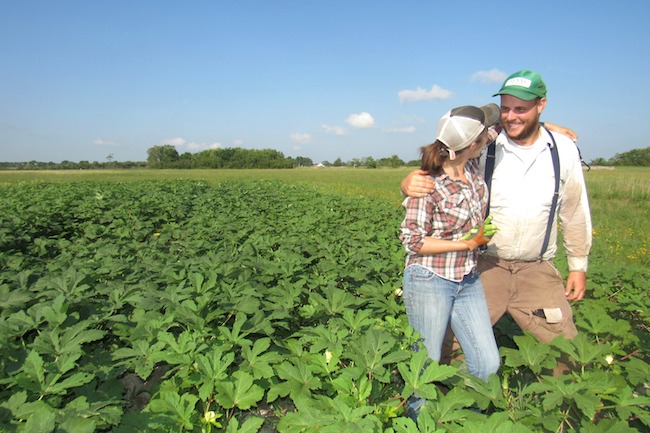
2018 Farm Grantees
Small Farms Awarded Funds to Implement Sustainable Agriculture Projects
The FruitGuys Community Fund is excited to announce the 2018 class of farm grantees. This year, we received a record 130 letters of intent (a 60% increase) proposing many wonderful sustainability projects from very worthy farms. Our hardworking volunteer review committee faced tough choices narrowing the 130 down to just 20 finalist farms whose values and goals best aligned with our Farming Manifesto. From there, we hoped to award grants to 12 farms. However, additional donations allowed us to fund 13 projects this year! (Huge thanks to our generous supporters!) This year, we are pleased to award 13 small American farms and agricultural nonprofits a total of $47,534 in funding. Our total awards grew by $4,651 and we extended our reach to farms located in Texas, Ohio, Connecticut, and Washington State.
These farms will use their grants to complete a variety of sustainability projects including adding beneficial insect habitat, season extension, beehives, and compost systems. Their projects will help change and support communities across the United States.
Meet The FruitGuys Community Fund’s Class of 2018 Farm Grantees!
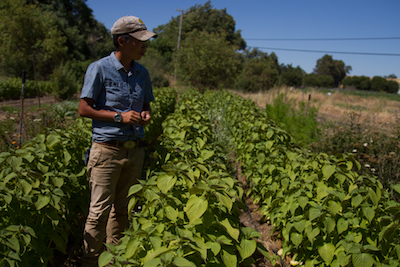 Namu Farm/Choi and Daughters Produce, a 2-acre farm in Winters, CA, grows East Asian herbs and vegetables and partners with Namu Gaji restaurant in SF, and also distributes a small veggie box to local Korean community in the East Bay in addition to producing commercial seed for Kitazawa Seed Company. Their $3,794.29 grant will allow them to preserve and improve heritage varieties of Asian vegetable crops with a focus on the needs of small scale organic farmers. Funding would go towards infrastructure for a hoop house, nursery benches, multiple sized screens, shade cloth and tools for hand processing of seeds.
Namu Farm/Choi and Daughters Produce, a 2-acre farm in Winters, CA, grows East Asian herbs and vegetables and partners with Namu Gaji restaurant in SF, and also distributes a small veggie box to local Korean community in the East Bay in addition to producing commercial seed for Kitazawa Seed Company. Their $3,794.29 grant will allow them to preserve and improve heritage varieties of Asian vegetable crops with a focus on the needs of small scale organic farmers. Funding would go towards infrastructure for a hoop house, nursery benches, multiple sized screens, shade cloth and tools for hand processing of seeds.
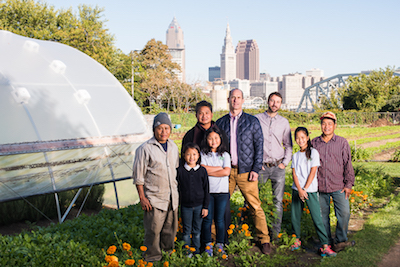 The Ohio City Farm by Refugee Response, a 6-acre agricultural non-profit serving newly arriving refugees in Cleveland, OH, grows over 60 crop varieties that are distributed through a CSA, direct to restaurants, and through farmers’ markets. Their $2,780 grant will allow them to purchase two new walking tractor attachments.
The Ohio City Farm by Refugee Response, a 6-acre agricultural non-profit serving newly arriving refugees in Cleveland, OH, grows over 60 crop varieties that are distributed through a CSA, direct to restaurants, and through farmers’ markets. Their $2,780 grant will allow them to purchase two new walking tractor attachments.
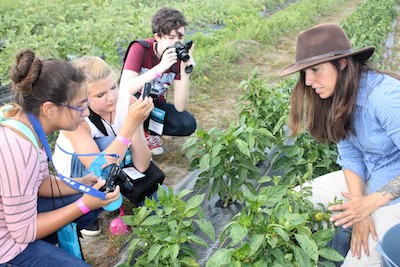
Moon Dog Farms, a 17-acre family-farm in Sante Fe, Texas, grows Certified Naturally Grown fruits, vegetables, and flowers. Their $5,000 grant will allow them to purchase three caterpillar tunnel kits, shade cloths, and a silage tarp to extend their growing season, protect crops, and improve soil health. They plan to host on-farm workshops highlighting how this system can create protected micro climates for growing in the Texas Gulf Coast region.
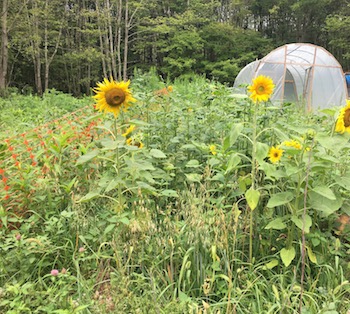 Radical Roots Farm, a 4-acre family-farm in Canterbury, CT, grows heirloom fruits and vegetables in addition to raising heritage livestock. Their $4,500 grant will allow them to purchase the tools, supplies, structures, and larvae to develop a composting system with Black Soldier Flies. This would allow them to utilize wastes, such as manure and expiring produce, and make supplemental feed high in protein and fat for their livestock.
Radical Roots Farm, a 4-acre family-farm in Canterbury, CT, grows heirloom fruits and vegetables in addition to raising heritage livestock. Their $4,500 grant will allow them to purchase the tools, supplies, structures, and larvae to develop a composting system with Black Soldier Flies. This would allow them to utilize wastes, such as manure and expiring produce, and make supplemental feed high in protein and fat for their livestock.
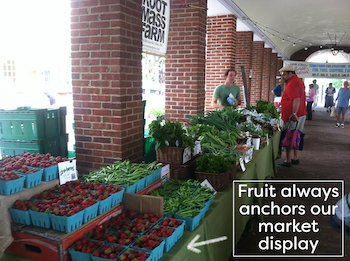 Root Mass Farm, a 5-acre farm in Oley, PA, grows a diverse mix of annual vegetables, melons, perennial herbs, and small berries. They use organic methods and place a strong emphasis on soil health while striving to create a vibrant farm ecosystem. Their produce is sold at two Philadelphia farmers’ markets and through a CSA. Their $3986 grant will allow them to build 21’X48′ high tunnel with 21 fig trees.
Root Mass Farm, a 5-acre farm in Oley, PA, grows a diverse mix of annual vegetables, melons, perennial herbs, and small berries. They use organic methods and place a strong emphasis on soil health while striving to create a vibrant farm ecosystem. Their produce is sold at two Philadelphia farmers’ markets and through a CSA. Their $3986 grant will allow them to build 21’X48′ high tunnel with 21 fig trees.
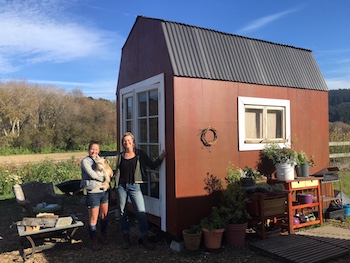 Fly Girl Farm, a 4-acre farm in Pescadero, CA that gives young aspiring female farmers an opportunity to experience all aspects of running a small farm, grows a wide variety of berries, vegetables, and cut flowers sold direct to customers at four local farmers’ markets and to local chefs. Their $4,856 dollar grant will cover the cost of photovoltaic solar panels, a charge controller, a battery bank, and an inverter to harness and store the power needed for their small farm office and intern housing.
Fly Girl Farm, a 4-acre farm in Pescadero, CA that gives young aspiring female farmers an opportunity to experience all aspects of running a small farm, grows a wide variety of berries, vegetables, and cut flowers sold direct to customers at four local farmers’ markets and to local chefs. Their $4,856 dollar grant will cover the cost of photovoltaic solar panels, a charge controller, a battery bank, and an inverter to harness and store the power needed for their small farm office and intern housing.
 Hope Mountain Farm, a 4-acre farm in Leavenworth, WA, grows certified organic berries and vegetables in addition to keeping bees. They sell their products via farmers markets, restaurants, grocery stores, schools, on farm, and through a CSA. Their $5,000 grant will allow them to transition to “no till” production by purchasing silage tarps, ground cover, and a “Pyroweeder,” eliminating the practice of tilling in weeds with a tractor/tiller and thereby improving soil health and minimizing water run-off.
Hope Mountain Farm, a 4-acre farm in Leavenworth, WA, grows certified organic berries and vegetables in addition to keeping bees. They sell their products via farmers markets, restaurants, grocery stores, schools, on farm, and through a CSA. Their $5,000 grant will allow them to transition to “no till” production by purchasing silage tarps, ground cover, and a “Pyroweeder,” eliminating the practice of tilling in weeds with a tractor/tiller and thereby improving soil health and minimizing water run-off.
 Cattail Organics, a 5-acre farm in Athens, WI, grows a variety of vegetables, cut flowers, herbs, and maple syrup that is distributed direct to CSA members, restaurants, small groceries, and schools. They also donate weekly to local food banks and shelters. Their $5,000 grant will allow them to purchase a variety of tools, equipment, and seeds to support conservation efforts for beneficial insect habitat through a unique approach to lessening soil disturbance in annual vegetable and flower production.
Cattail Organics, a 5-acre farm in Athens, WI, grows a variety of vegetables, cut flowers, herbs, and maple syrup that is distributed direct to CSA members, restaurants, small groceries, and schools. They also donate weekly to local food banks and shelters. Their $5,000 grant will allow them to purchase a variety of tools, equipment, and seeds to support conservation efforts for beneficial insect habitat through a unique approach to lessening soil disturbance in annual vegetable and flower production.
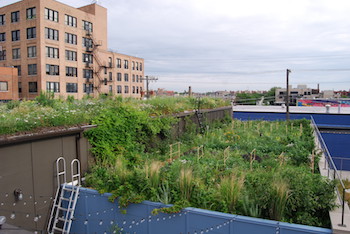 The Roof Crop, an urban farm growing across 30,000 square feet of rooftops in Chicago, IL, produces leafy greens, root vegetables, peppers, tomatoes, apples, herbs, and edible flowers. Their $1,950 grant will allow them to amplify their sustainability practices and create new educational and economic opportunities by adding three beehives to their flagship farm.
The Roof Crop, an urban farm growing across 30,000 square feet of rooftops in Chicago, IL, produces leafy greens, root vegetables, peppers, tomatoes, apples, herbs, and edible flowers. Their $1,950 grant will allow them to amplify their sustainability practices and create new educational and economic opportunities by adding three beehives to their flagship farm.
 Doce Lume Farm, a 2-acre farm in Frederick, MD, grows certified organic herbs and vegetables for wholesale. Their $1,735 grant will allow them to build an 8’x 92′ low tunnel to extend the growing season as well as establish a compost system. They plan to test compost and document the improvement of organic soil matter, weed suppression, and crop productivity to share with the Beginning Farmer Training Program network.
Doce Lume Farm, a 2-acre farm in Frederick, MD, grows certified organic herbs and vegetables for wholesale. Their $1,735 grant will allow them to build an 8’x 92′ low tunnel to extend the growing season as well as establish a compost system. They plan to test compost and document the improvement of organic soil matter, weed suppression, and crop productivity to share with the Beginning Farmer Training Program network.
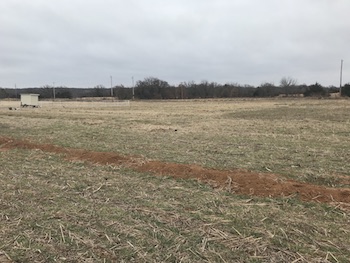 Canadian Valley Farms, an 80-acre family-farm in Lexington, OK, grows chemical-free heirloom fruits and vegetables in addition to keeping bees and producing meat products from heritage livestock breeds. Their $5,000 grant will allow them to add disease resistant apple varieties and blackberries to the farm, demonstrating that sustainable apple and blackberry production is a viable enterprise in their climate region.
Canadian Valley Farms, an 80-acre family-farm in Lexington, OK, grows chemical-free heirloom fruits and vegetables in addition to keeping bees and producing meat products from heritage livestock breeds. Their $5,000 grant will allow them to add disease resistant apple varieties and blackberries to the farm, demonstrating that sustainable apple and blackberry production is a viable enterprise in their climate region.
 47 Daisies, a 12-acre agricultural non-profit in Vassalboro, ME, grows a mix of vegetables, fruit, and mushrooms distributed through retail outlets and 47 Daisies Food Access Programs for low income, seniors, and children. Their $2,500 grant will allow them to develop an orchard of peach, pear and plum trees in addition to native wildflower plantings to support pollinators, and bat and bluebird boxes to provide necessary habitat and natural pest control.
47 Daisies, a 12-acre agricultural non-profit in Vassalboro, ME, grows a mix of vegetables, fruit, and mushrooms distributed through retail outlets and 47 Daisies Food Access Programs for low income, seniors, and children. Their $2,500 grant will allow them to develop an orchard of peach, pear and plum trees in addition to native wildflower plantings to support pollinators, and bat and bluebird boxes to provide necessary habitat and natural pest control.
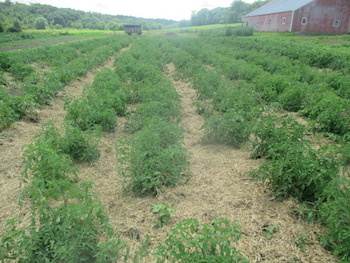 Christensen’s Farm, a 7-acre family-farm in Browntown, WI, grows a diverse mix of fruits and vegetables in addition to having 400 laying hens, and honeybees. Their products are distributed at two farmers markets and through a CSA. Their $1,463.50 grant will allow them to increase their beehives to 8 hives, one of which would be an observation hive for educational curriculum with local 4-H, school, and community groups.
Christensen’s Farm, a 7-acre family-farm in Browntown, WI, grows a diverse mix of fruits and vegetables in addition to having 400 laying hens, and honeybees. Their products are distributed at two farmers markets and through a CSA. Their $1,463.50 grant will allow them to increase their beehives to 8 hives, one of which would be an observation hive for educational curriculum with local 4-H, school, and community groups.
For project updates throughout the year be sure to sign up for our newsletter!
Each year, The FruitGuys Community Fund strives to fund more sustainable farm projects like these. We believe that small farms have the power to change their communities and help save the environment. If you’d like to see more farms receive grants next year please consider donating. Every dollar counts.




